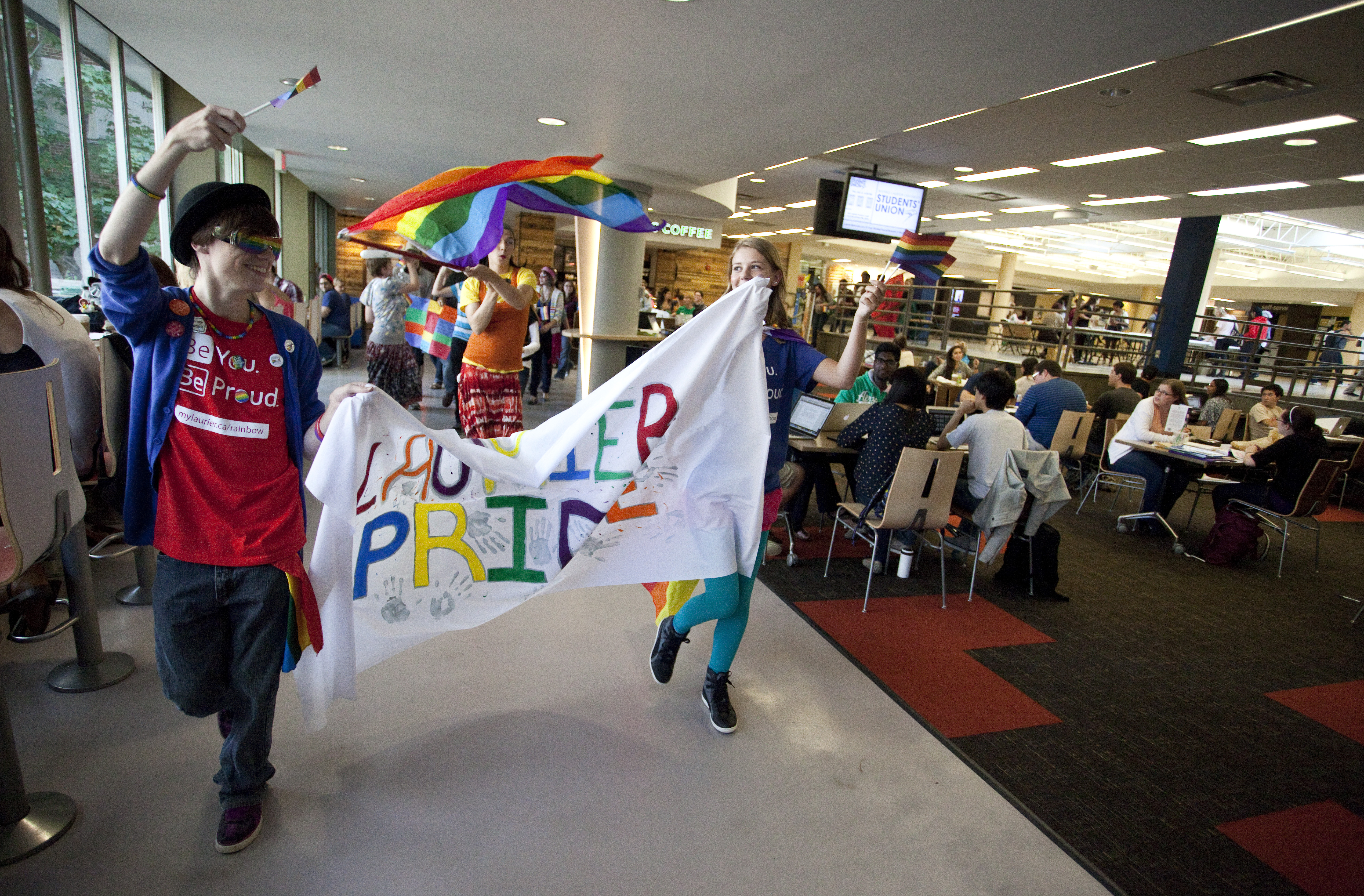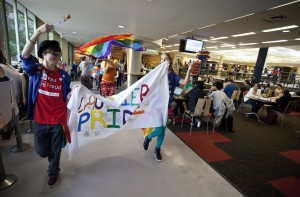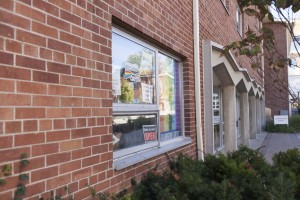Feature: A ‘constant and ongoing process’

Features editor Alanna Fairey goes in-depth about Queer culture at Laurier this Queer Awareness Week

When Sam Lambert, Wilfrid Laurier University Students’ Union president and CEO, started to question if he was gay, he reacted how most young people do: he repressed himself.
“It’s not something you just kind of realize like, ‘Oh I’m gay,’” Lambert said.
“I think even from when I was pretty young, like 10-15, you start having thoughts about how you might be a little more interested in men, whatever it may be. But you repress them.”
The main purpose of Queer Awareness Week, which is run by the Rainbow Centre and kicks off on Oct. 7, is to encourage inclusivity and acceptance of members of the LGBTQ community. This week is meant to help exercise acceptance and understanding of lesbian, gay, bisexual, transgender and queer young people and the struggles that they may face in their everyday lives.
Acceptance of the self
Coming out is a hard thing to do, especially when the fear of being unaccepted always looms.
Lambert said high school was a difficult time for him. He said he had a few girlfriends during this time, but it was never really romantic, admitting that it got to a place where he was in these relationships to keep up appearances.
“High school is also a really tough place to come out,” Lambert shared. “You’re kind of like, ‘Oh, I can convince myself to be straight.’”
While he was in second year, Lambert had a girlfriend for a short period of time and the two are now good friends.
Karli Ferriolo, the marketing and outreach coordinator at the Rainbow Centre, shared that some students often don’t utilize the Rainbow Centre due to a fear of judgment or they do not feel entirely sure about how they feel in terms of their sexuality.
“Its a personal kind of growth where you don’t want to push yourself too far if you’re not comfortable but at the same time you need to take that step,” Ferriolo said.
“Everyone has their own struggles with coming to terms with their sexuality or however they want to come across. With the Rainbow Centre, we are here as a resource and we hope people on campus don’t feel intimidated by the Rainbow Centre,” she said.
“Coming out is a constant and ongoing process you don’t just come out one time and that’s it. It’s a constant, recurring thing.”

Ferriolo also shared that the Rainbow Centre has a “no assumptions” policy, meaning that volunteers and coordinators of that space do not assume anyone’s sexuality or make the claim that anybody has to identify as queer to be a member or volunteer.
“We try to always be positive and provide a learning environment so if someone comes in and they aren’t sure, there will be a discussion and conversation,” Ferriolo said.
“If anyone feels that they need a private conversation, we are always here to have that talk and we are in contact with a lot of people because of our resources.”
Ethan Jackson, a transgender fifth-year student, currently majoring in women and gender studies and cultural studies, said that some social rhetoric and ideologies regarding the Trans community are often misleading.
“For me, I was never born in the wrong body,” Jackson said. “This is who I am.”
However, Jackson admitted that he felt some discomfort with himself and the way others perceived him.
“Growing up, I did feel uncomfortable with a lot of the ways that I was kind of seeing myself and how others were seeing myself,” Jackson said.
Lambert realized that he could not keep denying who he was and told one of the dons that he had been working with. Within a month, Lambert had come out to his family and friends. Leading up to coming out, Lambert shared that he needed emotional and mental strength, all while trying to stop the worst-case scenarios from playing in his head. However, he knew it had to be done.
“Mentally it’s very tiring and it just kind of creeps into everything you do like work and school, like this one all-encompassing thing that’s takes all of your time,” Lambert said.
“So coming out and finally saying it, even though I was in a pretty good place and was comfortable with myself, its like a whole weight is lifted off your shoulders.”
Inevitable insensitivity
Whether it is intentional or not, the issue of insensitivity is one that continues to be a continuous hurdle in the LGBTQ community.
With the unceasing evolution of language, there are some terms that are more preferred than others. This can cause some difficulty if someone is unsure about how to address someone.
“Language is constantly changing and constantly evolving because new terms are being added for old ones that are problematic and its something that you need to keep on top of,” Ferriolo explained.
“The term ‘queer’ used to be used as a slur and now the queer community is reclaiming that term to be more inclusive.”
In some unfortunate cases, there are incidences where homophobic slurs are intentional. The phrase “that’s so gay” is still used to describe something depicted as stupid or disliked.
“As members of the LGBTQ community, we have to be confident enough and willing to have a conversation with someone,” Lambert said.
“I think that might be difficult because we are already a minority already but I think Laurier is the best place, if anywhere, to speak out.”
Lambert admitted that he was recently involved in a situation with someone he went to high school with while he was at Wilf’s. Lambert described the situation as being very heated, as this person was very vocal about his views on Lambert’s homosexuality.
“This person was talking about how they didn’t agree with my lifestyle and that it was wrong and that it was against god,” Lambert said.
The day after the incident, Lambert said he made sure to surround himself with the people that meant the most to him so he could reflect on the situation.
“It was not the best experience, obviously, but I think it’s one that makes you stronger and now I know how to deal with those situations better, but it was tough.”
Jackson recalled an incident when he was in first-year where people from his residence had been drinking and asked him insensitive questions regarding sexual activities and his genitalia.
“It’s a culture that really needs to shift their ways of thinking,” Jackson said. “I had to realize that these people wanted nothing to do with me; they were just curious.”
Lambert stressed the importance of not making assumptions regarding one’s sexual orientation or identity and to be mindful of language and how one might prefer to be identified.
“I think we are getting to a point where assuming that I have a girlfriend isn’t the right thing to do,” Lambert said.
“You have to be careful with the kind of language you use, so saying things like ‘partner’ rather than ‘boyfriend’ or ‘girlfriend’ and be careful with the words that you are using to describe the gay community. I think language is a really good place to start.”
The power of support
Although Lambert’s intention wasn’t to come out to the first-year students during his speech at the opening ceremonies during Orientation Week, he did so because he wanted to impact students with something that would have impacted him as a first-year.
“It wasn’t just about coming out it was about being who you are and be able to grow into the person you really want to be at this school, so I think from that it became easier to relate it to myself,” Lambert said.
“I think when you give it a personal touch, it’s relatable for people who are debating not only coming out but also for those who are masking who they are in some other way.”
Lambert also made himself available to students who are having a hard time coming to terms with their sexuality or understanding how they feel.
The Rainbow Centre fosters an educational aspect into all inquiries that people may have about the centre or their own sexuality. Coordinators help to set students up with the proper resources and support as needed.
“We are here for peer support, so if anyone felt like they needed someone to talk with. If it had to do with the coming out aspect, we are always here to talk and if they had questions, we would set them up with the resources,” Ferriolo explained.
Though he did not use the Rainbow Centre personally, Lambert has praised its value for being a safe haven for the gay community and promoting inclusivity and awareness. Jackson praised it for being a “liaison” for the first steps towards the proper resources needed.
For some, the support of family and friends is enough. After coming out, Lambert was overwhelmed with the positive support he had from his family and friends. He considered himself lucky to be able to openly talk to his family about it if he were to have a bad day or a negative experience.
“I was lucky enough to have a positive experience coming out, but not everyone will.”
Unfortunately, not everyone has the support of their family after coming out. Jackson admitted to having a negative experience coming out as trans to his family, as they were not accepting and believed it was a phase.
Although he and his family do not have a relationship, Jackson is thankful for his loyal group of friends, whom he identifies as his “chosen family.”
“I have a really fierce and fabulous set of friends who I can call up any time and it’s really lovely to have that kind of community,” Jackson said.
“It makes you more aware of what you’ve gone through and to understand your hardships when you had people around you and you didn’t realize it at that point but now that you see it, when someone else is having a bad day, you know how they feel.”
‘Everything becomes crystal clear’
The increase of awareness has generated more of an acceptance of the LGBTQ community.
Although there are still isolated incidences of homophobia and intolerance of the LGBTQ community within some universities, the call for education has helped many people recognize that there are other ways of living.
“Our campaigns and discussions are a great way for people to become more aware and understand that there is not just heterosexuality,”
Ferriolo said. “Sexual diversity exists everywhere, it’s just a matter of opening your eyes to it.”
However, there is still much work that can still be done. Jackson believes that a lot of it has to do with understanding that people are just people, no matter who they are.
“I don’t think that we are going to finish this tomorrow,” Jackson said. “We are not there yet but we are making huge stratas to get there.”
Before coming out and accepting his sexuality, Lambert used the metaphor of how he was living life without contacts. Metaphorically finding those contacts has enriched his life.
“It was like I was living life without glasses and everything was just blurry and then when you come out, everything becomes crystal clear. Everything just has more value,” Lambert said.
“I think it just allowed me to be happy in everything I’m doing. It allowed me to live my life like it’s 20/20 vision.”


